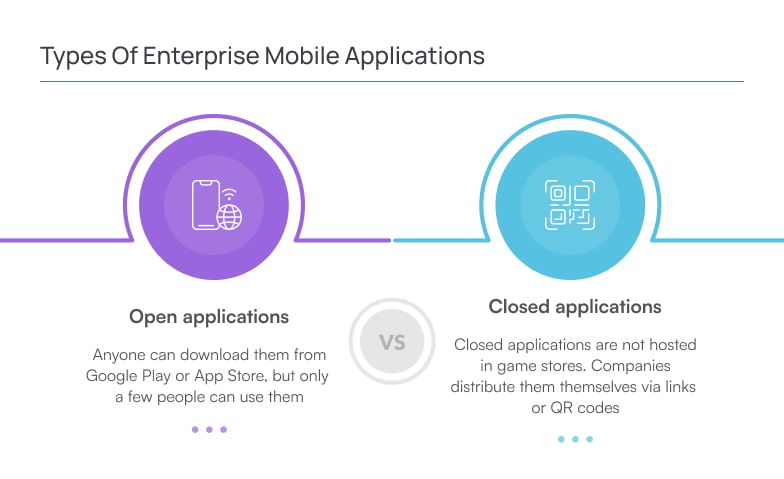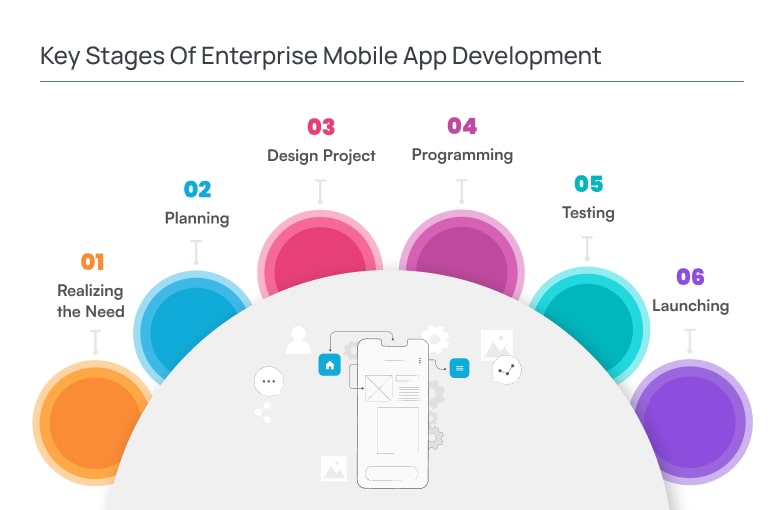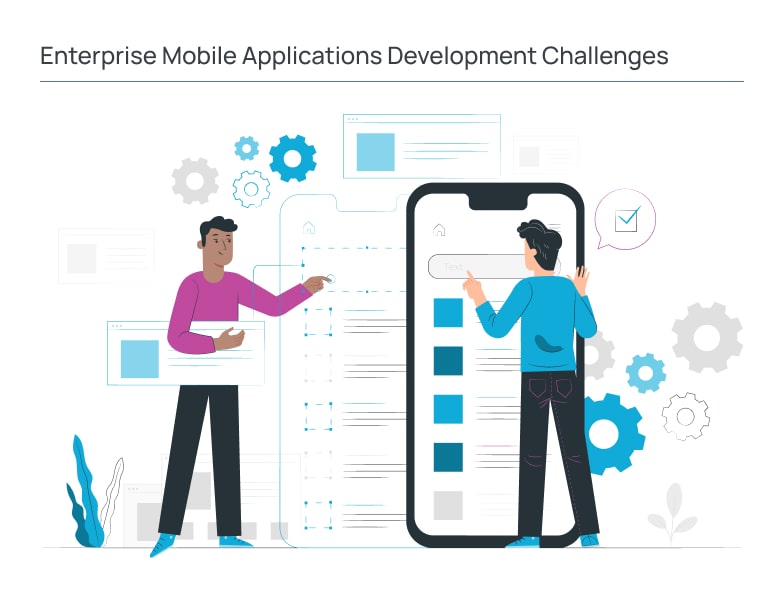Business apps are usually aimed at their audience — they are hosted in stores and help establish contact with the customer. However, large organizations need to solve internal tasks, so there are other types of applications — the enterprise ones. They regulate processes inside the company and are available only to its employees.
People are already used to the fact that a regular business app contains several tabs, purchase options, support connections, and much more. However, in the case of enterprise mobile apps, the development will be significantly different. There are also pitfalls and nuances that company owners will have to face here. In this article, we will tell you how enterprise services will improve work at your company and help you save money. If you want to learn more about enterprise mobile application development, key stages, costs, and possible challenges, you have come to the right place. Binerals experts have prepared a lot of useful information for you on the topic of enterprise mobile app development.
What Is Enterprise Mobile App Development?
Enterprise software is used within the company — many customers may not even realize that there are such applications. And that’s okay because they are developed for other purposes. Thanks to such a service, employees of different departments interact with each other to solve common tasks. The benefit of a corporate application is that it can be developed for a business from any sphere of activity.
Statistics show about 90% of companies use mobile technology to increase their efficiency. And it works well — every third top manager notes an improvement in CP (coefficient of performance) after implementing a corporate application in the working environment. Document exchange, task control, communication between employees from different departments – all this is now available in a couple of clicks. This pace of work significantly increases the company’s profits.
Real Example of Developing Enterprise Mobile Application
The best way to understand what enterprise mobile app development is all about is to see a real project. We have for you one vivid example of developing an app for internal use in an organization.
A cleaning company has been in business for 2 years and after an advertising campaign, they started getting more orders. It became difficult to allocate who, where and when to do the cleaning. It often turned out that in one area ten cleaners were free and in another area one was working for ten. Cleaning ruined relations with clients and employees, no cleaning was done and no money was received.
The problem was solved by an app that distributes work zones, selects the best routes for employees, takes into account their working hours, and makes reports. Now everyone works without downtime and is overloaded with schedules, has time to do more work, and still gets by.
Do you want to improve the efficiency of your enterprise?
Get help with enterprise mobile app development right nowTypes of Enterprise Mobile Applications
Before you start developing enterprise applications, you need to understand what type of app it will be. Generally, enterprise mobile apps are divided into two types — open and closed.
- Open applications. Anyone can download them from Google Play or App Store, but only a few people can use them. Only employees have access to such applications – they get it through an ID (a number issued by the company). This means that no outsider can log in, even if they download the app. The app helps to solve work tasks faster. In it, salespeople send photo reports, check stock availability against databases, draw up planograms and much more.
- Closed applications. Closed applications are not hosted in game stores. Companies distribute them themselves via links or QR codes. The application files are stored in the cloud. A new employee receives a link and downloads the app to their phone – usually from Android (they can also be installed on iOS, but it’s more complicated). Full functionality is only available when connected to the corporate network – another precaution. Before working with a closed application, the company should either make sure that all employees have suitable devices or provide them at their own expense.

What Functions Do Mobile Enterprise Applications Perform?
Enterprise applications can be classified by type of availability, by scale and, of course, by functionality. After all, depending on the sphere in which the company operates, what tasks managers face, the functionality of the application will be different. What are the main tasks a enterprise mobile application can perform?
- Order management. The enterprise application receives all completed orders from customers. It is very convenient to get, process and manage them here. This can increase the speed of customer service.
- Employee interaction. Some applications have divisions into departments where employees can communicate with each other. This is a great alternative to using social media to discuss work.
- Report compilation. Many companies have long ago abandoned written reports and switched to ready-made report forms in the enterprise application. Employees can quickly fill out a ready-made form and send it to management for review.
- Payment system. Employees can process payments faster with the help of enterprise applications. Moreover, it is possible to set up an automatic payment system.
As you may have already realized, enterprise mobile software brings a lot of value to an organization. It helps to automate some management processes, make communication easier, and improve customer service. However, the type of enterprise app directly depends on the scope of your business and your goals.
Key Stages of Enterprise Mobile App Development
We have reached the most important section of our article – the main stages of creating an enterprise mobile app. Before moving on to specific actions, you should build an enterprise mobile application development strategy. We will help you develop the right plan by providing you with a description of the key stages of enterprise app creation.

Realizing the Need
You should start developing an enterprise application on your smartphone when you feel the need to do so. What are the signs?
- You are not satisfied with the performance of your employees.
- The efficiency of your company is low.
- There is poor communication among your employees.
- You want to take your organization to a new level of competitiveness.
Overall, almost every company needs to develop a mobile enterprise app. Even if things are going up for you, your success is not limited by anything. Such an app will help the company to work even better.
Planning
The project discovery phase is one of the most important stages in the entire enterprise mobile app development pathway. This stage involves planning and understanding the goals of creating the app. You need to decide on the type of application, supported platforms, functions, and main tasks.
Design Project
In addition to functional elements, mobile apps need a design that will meet all UX trends and requirements. There are two important components of design: user needs and UX elements. In terms of user needs, these include navigation, screen connectivity, and order of components.
Programming
Once the TOR and the design for the application are ready, the work on the project moves to the programming stage. During this stage, the functionality of the application is created.
Testing
This stage eliminates all bugs and technical inconsistencies in the application. Ignoring this stage means losing the first users after launch, as some modules may not work on this or that device. Similarly to website testing, the layout and its compliance with the design of a web application are checked first, and then the functional part of the project is tested.
Launching
Enterprise applications contain confidential information documents, so the security service of companies and product owners prohibit placement in the open marketplaces Google Play and AppleStore. There are two options for placing iOS applications: the Apple Developer Program and Apple Developer Enterprise Program. These are special enterprise projects that allow you to download and use apps. With Android apps, there are no such restrictions. All you have to do is send a link or file to the user.
Don't know how to develop a mobile enterprise app on your own?
Contact UsEnterprise Mobile Applications Development Challenges
Mobile apps have evolved from «nice to have» tools to «must have» tools in many enterprises. However, developing enterprise applications is not that easy process. You might be puzzled about what features you should keep and what you should do with them. But don’t worry, because we will cover all the possible challenges you may face.

Secure Moderated Data Infrastructure
A centrally managed infrastructure is needed to keep an enterprise mobile solution secure at all times. It should never keep security in fear. This attitude builds trust with the business. And it also ensures that important business data is always safe. Data is the most valuable commodity in the information age. Loss of business data can be the biggest loss for any business venture. If we talk specifically about data sharing through enterprise mobility, you should track the solutions.
Autonomous Use
There are places where your employees may not have access to data services. Thus, you must ensure that the software accesses such instances. Thus, you must design an application that allows users to interact with the program even when there is zero data coverage and that uses data only when it is actually needed.
Safety
According to Skycure, 25% of mobile devices face a cyber security threat every month. This means that if you don’t focus on making your app secure enough, you’re guaranteeing near-term security issues. In addition, threats can come from anywhere.
Customer Experience
A good user experience is crucial for user adoption. Make sure your app is truly usable. Cross platform app development can employee device-independent and get a great user experience.
Integration with Outdated Systems
Your organization may be using outdated systems, and you can’t change that overnight. So, you need to make sure that your enterprise application can work with these outdated systems. For example, if you want to develop an app to help your employees update work queues when they are on the move or access internal systems from their mobile devices. To do this, your employees must have access to your company’s network or HR system.
Developing enterprise applications may seem easier at first than it may be in reality. It is very important to be able to properly implement all the features you need to ensure a great user experience, smooth operation and security.
Enterprise App Development Cost
You may already know about the specifics of mobile app development pricing for businesses, but what do you know about the enterprise app development cost? The following factors affect the cost of developing such software for internal use in companies:
- Functionality. The price depends primarily on the purpose of creating the application. If the functionality is limited and includes only communication between employees and work schedules, such an application cannot be expensive.
- Design. UI and UX services can also affect the final cost of enterprise app development. On average, designers are willing to offer $1,000 for their services.
- Additional features. For example, you can also implement artificial intelligence in the app to solve certain tasks. However, each additional feature will drain your budget faster.
- Supported devices. The cheapest option is to build an application that will support only the Android operating system. Developing a cross-platform application will cost you much more.
A good enterprise application that is supported on different platforms and has a wide range of functionality can cost 10-20 thousand dollars. However, each case will be individual because everything depends on your goals and desires.
Conclusion
Does a business need an enterprise app? There is only one answer — of course, you need such software. It speeds up work inside the company, saves employees from paperwork and endless calls, and helps train newcomers without external assistance.
The task of mobile developers is to make sure that people use the app every day and it helps them do their work, not hinders them. The experienced developers at Binerals have created a proprietary approach to mobile enterprise app development. Binerals offers the necessary mobile app development services and we already have a lot of cases of creating such software in our arsenal. We know how to make an enterprise application useful and understandable.
FAQ
When should I develop an enterprise mobile app?
The need for an enterprise app depends on the size of your business and your goals. You don’t need an enterprise app if you have 10 employees and just want to organize their schedules. If you have dozens of people in your team and they need to interact with each other all the time, then an enterprise app is your best option.What areas of business can I implement a mobile enterprise app into?
There are hundreds of real-life examples of mobile enterprise application development for companies from a wide variety of industries. Among the popular sectors are: online stores, taxi services, logistics, warehouse management, restaurant chains, supermarkets, and much more.What business problems does enterprise software solve?
Enterprise applications make work communication easier. If an important decision needs to be made (for example, ordering a reference or signing a document virtually), a person doesn’t have to rush to the office — he can do it from home. This is only a small part of the comfort that enterprise software provides. More often, it is made to solve more global tasks. Enterprise applications are flexible solutions, so they can be created for almost any purpose.